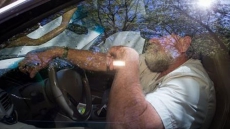TORONTO — Canadians on average are socking away more money for potential financial emergencies than in the past, but a new survey has found that almost a quarter are still living paycheque to paycheque.
The survey, conducted by Pollara for the Bank of Montreal (TSX:BMO), found that Canadians on average have $41,694 in emergency savings, up from an average of $35,237 in 2014.
However, 24 per cent of respondents said they had hardly anything set aside and more than half (56 per cent), reported having less than $10,000 in available emergency funds.
Christine Canning, head of everyday banking at BMO, describes the ideal emergency savings fund as one that can replace three to six months of income.
Canning adds that an emergency fund represents more than just a cushion, saying it can provide peace of mind and help reduce the risk of increased debt if a financial emergency does come along.

The online survey polled 1,002 Canadians 18 years of age and older Aug. 17 and Aug. 18. The polling industry's professional body, the Marketing Research and Intelligence Association, says online surveys cannot be assigned a margin of error because they do not randomly sample the population.
By region, the survey found that those in Atlantic Canada had the lowest average amount of emergency funds set aside at $20,152, with only eight per cent having more than $50,000 available and 27 per cent with between $10,000 and $49,900.
B.C. residents had the most set aside, an average $70,364, with 21 per cent having $50,000 or more and 14 per cent between $10,000 and $49,900.
Elsewhere, the average amount set aside totalled $24,671 in Quebec, $41,088 in Ontario, $67,605 in Manitoba and Saskatchewan and $40,341 in Alberta.




